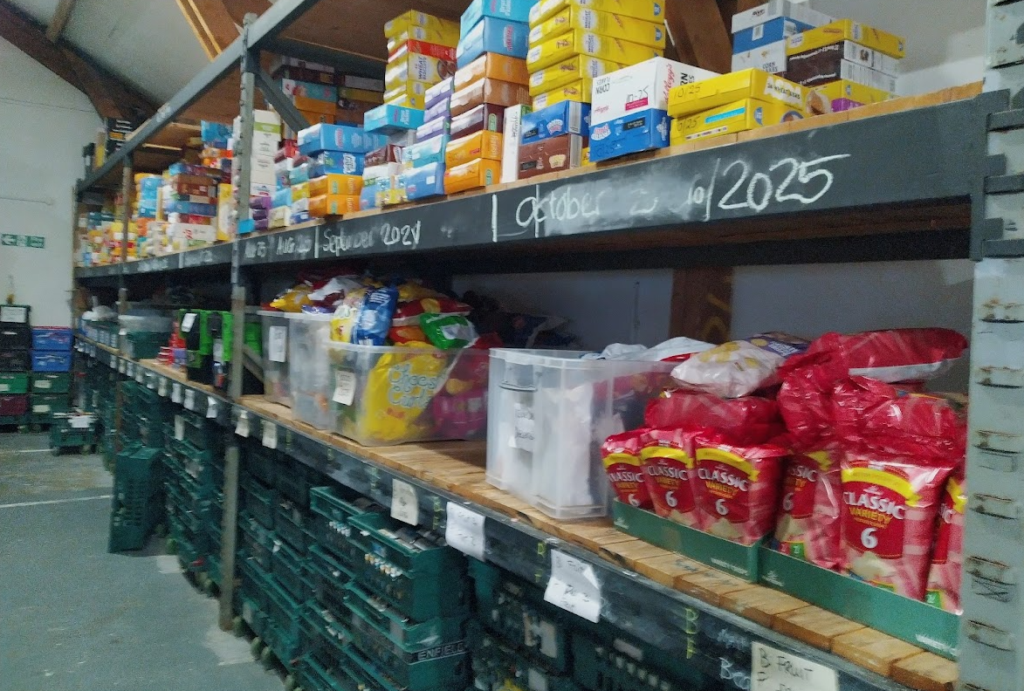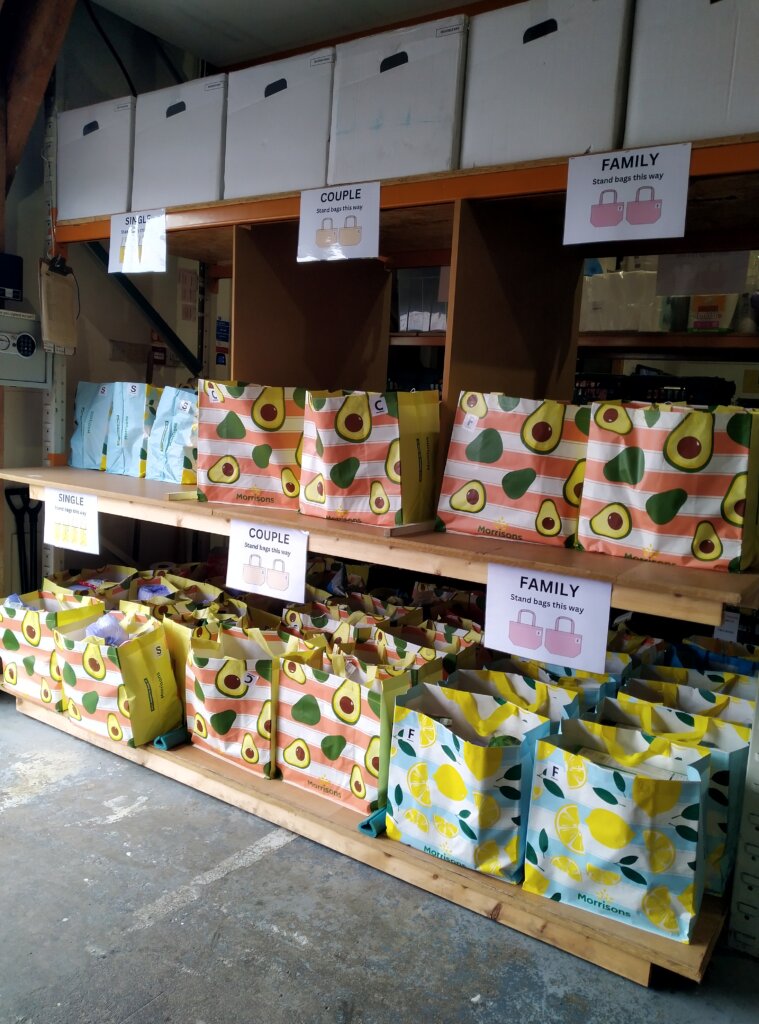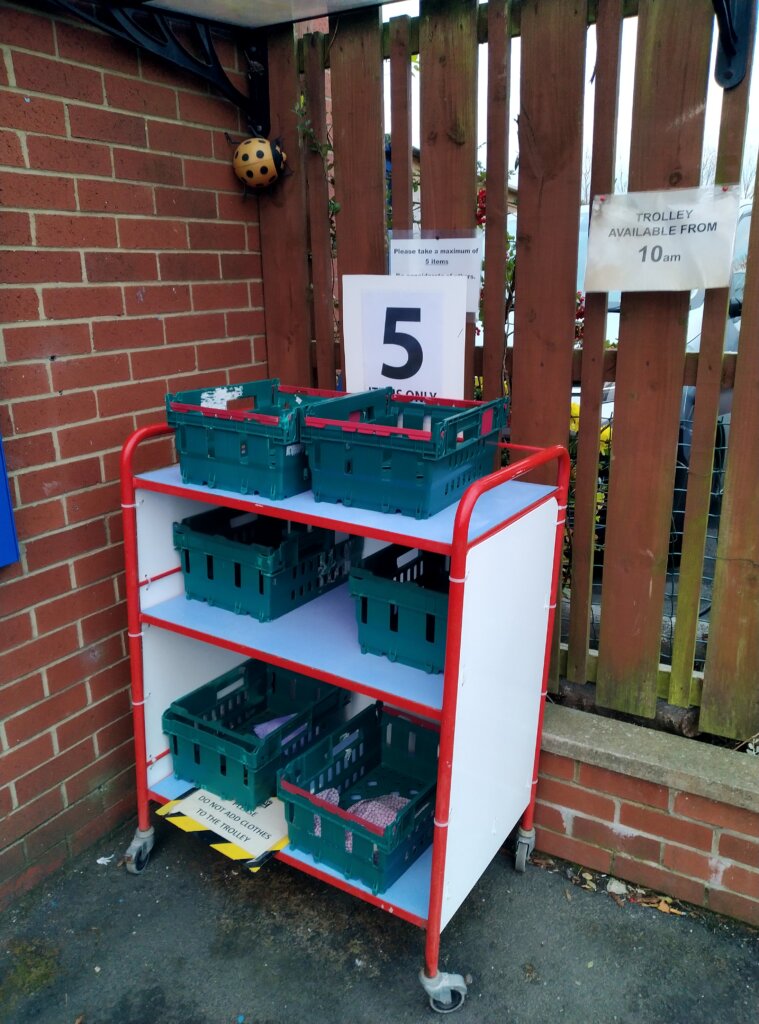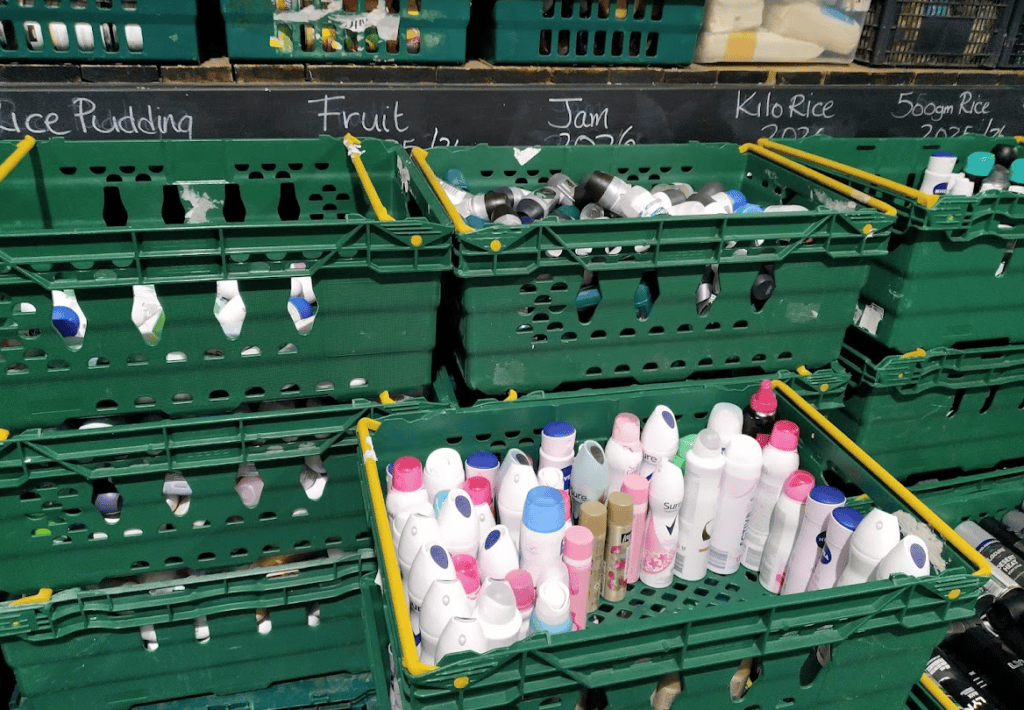“People who donated in the past are coming back as clients”: What I learned from a day at The Bay Foodbank
Written by Eleanor Tait on 18th December 2024
“Four thousand pounds a week?”
I’m shocked. It’s a huge figure, but this is what Maggie Walker, Chair of Trustees at The Bay Foodbank, says her organisation is spending every seven days to fill the bellies of those going hungry right on our own doorsteps.
Since 2022, Maggie goes on to tell us, the number of food donations received by the charity has decreased drastically by 85%. It’s fair to say that more than one or two people at the fundraiser are startled by the figure.
But Maggie isn’t wrong. In April 2024, new data revealed that in 2022/23, 2.3 million people in UK households had used a food bank in the past 12 months. This year, The Bay Foodbank, based in Meadowell, North Shields, has delivered in excess of 7,000 parcels in North Tyneside alone.
It begs the question – under such demand what does it take for the team to tackle such a scourge of hunger across North East every day?
So, a few weeks later at 9am on a chilly October morning I’m standing in front of The Bay Foodbank in Meadow Well, North Shields, readying myself to find out what goes into fending off food poverty.
I’m met at the door by Joe Scrase, the charity’s developments manager, who’s just about to begin his day, and as I step inside, I receive a warm welcome from Alfie, the charity’s waggy-tailed Volunteer of the Month.
“Every month!”, Joe tells me as I look around the bright reception area.
Yet, despite the cheery smiles (and waggy tails) that each member of the team greets me with, it can’t be forgotten that this is an organisation under constant pressure.
Joe introduces me to Jackie Dickinson who in 2012 co-founded The Bay Foodbank and has since taken up the reigns as warehouse manager.
It’s an enormous task – Jackie walks me through to the warehouse and it’s packed to the rafters. If the meticulously stacked and sorted crates weren’t sign enough, as she guides me through the parcel packing system it’s clear that organisational efficiency is key to providing swift and supportive responses to client referrals.

Inside the warehouse at The Bay Foodbank: Supplies are stacked and organised ready to be packed into emergency food parcels.
Inside the warehouse at The Bay Foodbank: Supplies are stacked and organised ready to be packed into emergency food parcels
Outside the warehouse we collect a supermarket trolley from their shed and Jackie gets me started off with packing a food parcel. Each parcel is designed to feed clients for about a week with their specific needs in mind, whether they are a family with children, living as a couple, alone, have limited cooking facilities, or are living on the streets.
When clients are referred to the food bank, their dietary requirements are enquired for; this means that vegetarians can continue to eat vegetarian, allergens are avoided, cultural practices are observed, and even individual tastes considered where possible. Recently, the food bank has seen a significant increase in the number of halal parcels requested, currently comprising approximately 2% of all referrals.
I’m packing a family parcel first, so Jackie helps me pack two large shopping bags as we whizz round counting off tins of beans, soup, vegetables, bread, tea, and biscuits from the guide she has handed me.
But after a few rounds of the warehouse, the crates that had seemed brimming with tins and jars are running alarmingly low. We’ve only packed supplies for three families.

Emergency parcels packed and stacked, ready to be delivered to clients.
Jackie predicts the charity will send out about 35 parcels during this shift; that means approximately 90 people might be fed by The Bay Foodbank today. By 11:12am, 11 of those have been processed. In addition, the trolley filled outside the warehouse with goods just beyond their recommended consumption period, put out for clients to take as they need, has been emptied – it was only rolled out at 10am.
Many of these donations come from supermarket waste reduction initiatives, and one of the biggest donators to The Bay Foodbank are Greggs.
“Greggs is a really important one for us,” Joe says, “because we often have clients who won’t have eaten for a couple of days.
“When they come to us – particularly when they’re coming to collect – they’ll have had it by the time they get to the gate, because it’s on top of the bag, it’s something they can have straight away.”

Products that are beyond their best before dates are placed in the trolley outside the food bank for clients to take as they need. By 11:10am, all the extra food here was gone – the trolley was only filled at 10am.
Despite this collaborative attitude, donations received by The Bay Foodbank have declined enormously over the past two years. Each week the charity is shelling out around £1,500 on Morrison’s supermarket orders to keep their shelves full.
At the moment, donations are flowing in from harvest collections and Jackie expects them to ramp up again at Christmas, but this is no long-term solution.
“Christmas is usually our biggest time, but donations have dropped massively over the last two years. Christmastime brings out the best in people because everybody wants to give something, but after Christmas, by March, nothing comes in.
“We went this year from February with nothing coming in. Normally the Christmas stock would last us through to May, but this year it was all done by February.
“Never, never been short of beans ever, but this year we ran out of beans and pasta. It’s just incredible, because they have always been the things we’ve had the most of, it’s the main two that people buy.”
Sitting down to chat with Joe, he puts the facts and figures into perspective.
“People who would have donated in the past are coming back as clients.”
Nurses, teachers and firefighters have all been clients of The Bay Foodbank. It would seem no one is too far away from experiencing food poverty.
Often, Joe explains, clients are referred because of a sudden change in circumstances – about 15% of clients fall into this category.
“Their house has flooded, they’ve lost, their job, their partner’s passed away, they’ve just come out of hospital, or they’re fleeing domestic violence.
“But the vast majority of our clients dip in and out and then we won’t see them again for a while.
“Then at the other end, there are the 15% who are long-termers. They have issues so deeply ingrained that they will always need some support. We know those with addiction issues are extra challenging to deal with because we can never offer enough support.”
As an emergency food provider, Joe is keen to note the sensitivity required to appropriately support clients.
“The parcel is designed to reflect what the client would purchase if they could afford to, so it’s very deliberately in a Morrison’s bag that anyone could go out and buy. If we deliver, it’s in an unmarked van,” he says.
“We don’t want our parcels to look like they’re Red Cross emergency parcels. They’re not in branded boxes or bags, because we want the client to retain that dignity.
“These are people who are highly vulnerable, and for a lot of them it would be a real low point, so we are very conscious of how we engage with them.”
The majority of the food bank’s clients, Joe explains, are single men in their 30s. Families with children are more likely to already be engaged with support services, whereas many of their single male clients are referred by the NHS, homeless charities, or have recently been released from prison.
But it’s not just people that The Bay Foodbank care for – as Alfie reappears at the door of Joe’s office, he gets me thinking about how much our animal companions become part of the family. It’s just as important to feed them as it is ourselves.
“I think it’s almost more important,” Joe tells me.
“We regularly come across clients who won’t have eaten for a number of days because they’ve been prioritising their pet, feeding their dog rather than themselves.
“On request we provide dog and cat food, because we know it’s expensive. A big sack of dried dog food – that’s £50.”
By 1:25pm, 45 parcels have been processed. That’s 10 more than Jackie predicted this morning, so it’s been a busy day for the volunteers.
Kay Bradshaw was once a volunteer at the food bank before she became their administrator; she says that volunteering as a student was a valuable escape from studies.
“It’s getting out of the house, giving your week some structure, feeling like you’ve got some purpose. It’s really good when you see other people, and other people you wouldn’t necessarily choose to see, I think that’s really important.
“But on a slightly perkier note, it’s better than any gym! You’re lifting weights and doing something physical that you wouldn’t normally do, it’s really good for you!”
On top of processing food parcels, we spend the afternoon beginning to sort through toiletry donations which will be made into gift packs for Christmas. Although it’s not their main focus, hygiene poverty comes hand in hand with food poverty, and where possible, the food bank tries to give their clients access to hygiene products too.

Toiletries are organised before being made up into gift packs for Christmas.
The attitudes of staff and volunteers seem to be overwhelmingly positive, but I wonder how easy it is to maintain a healthy mindset when meeting poverty at the doorstep every day, with some clients less receptive than others to their support.
“Some of the clients at the door are obnoxious, some of them are downright rude.” Jackie laughs.
“I mean, I had a sausage roll hoyed off my head once because I wouldn’t give someone a cake out of the cupboard.
“You get them, they’re few and far between, but you do get them. And then you get the other clients who are so, so grateful saying, ‘I wasn’t expecting all of this’.
“Some days it’s harder than others. It’s hard to come away and not think about that for the rest of the day.”
Since they opened their doors in 2012, The Bay Foodbank has delivered more than 62, 410 parcels across North Tyneside. By 4pm today, they can add another 55 to that number.
Sadly, there doesn’t seem to be any sign of these figures dwindling – in fact, they are set to surge ahead, and it is only with kindness and generosity of its supporters that The Bay Foodbank can continue to provide their vital services.
“This year, we will take in less donations than we will spend, so we’re going to lose quite a lot of money,” Joe says.
“Everything we do comes back to the community, the people of North Tyneside.
“Not only are we here to serve them, but we couldn’t do without them.”
To find out more about The Bay Foodbank, refer someone, donate, or volunteer your time, click here.







